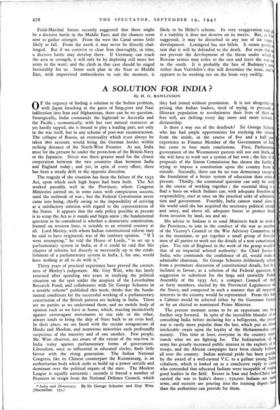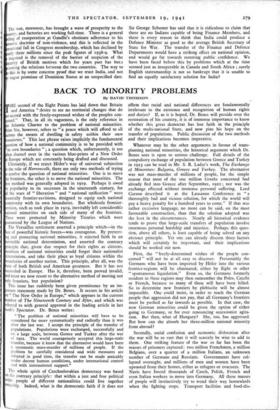A SOLUTION FOR INDIA ?
By H. G. RAWLINSON 0 F the urgency of finding a solution to the Indian problem, with Japan knocking at the gates of Singapore and Nazi infiltration into Iran and Afghanistan, there can be no question. Strategically, India commands the highroad to Australia and the Pacific ; economically, with her vast natural resources as yet hardly tapped, she is bound to play a leading part, not only in the war itself, but in any scheme of post-war reconstruction. The collapse of Russia, an eventuality which must always be taken into account, would bring the German hordes within striking distance of the North-West Frontier. At sea, India must for the present be under the protection of the British Navy or the Japanese. Never was there greater need for the closest cooperation between the two countries than between India and England today ; and yet, in spite of every effort, there has been a steady drift in the opposite direction.
The tragedy of the situation has been the failure of the 1935 Act, upon which such high hopes had been built. The Act worked passably well in the Provinces, where Congress Ministries carried on, in some cases with conspicuous success, until the outbreak of war ; but the Federal Constitution never came into being, chiefly owing to the impossibility of arriving at a satisfactory solution with regard to the representation of the States. It appears that the only policy possible at present is to scrap the Act as it stands and begin anew ; the fundamental question to be considered is whether a democratic constitution, framed on western lines, is suitable to an oriental country at all. Lord Morley, with whom Indian constitutional reform may be said to have originated, was of the contrary opinion. " If I were attempting," he told the House of Lords, " to set up a parliamentary system in India, or if it could be said that this chapter of reforms led directly or necessarily up to the estab- lishment of a parliamentary system in India, I, for one, would have nothing at all to do with it."
Thirty years of practical experience have proved the correct- ness of Morley's judgement. Mr. Guy Wint, who has lately returned after spending two years in studying the political situation on the spot under the auspices of the Leverhulme Research Fund, and collaborates with Sir George Schuster in a notable volume* published this week, thinks that the funda- mental conditions for the successful working of a parliamentary constitution of the British pattern are lacking in India. There are no parties as we understand them, and no mobile body of opinion such as we have at home, which, reacting instinctively against extravagant movements to one side or the other, - always tends to bring the ship of State back to an even keel. In their place, we are faced with the secular antagonisms of Hindu and Moslem, and numerous minorities each profoundly suspicious of the majority and of one another. Few people, Mr. Wint observes, are aware of the extent of the reaction in India today against parliamentary forms of government. Liberalism, once so influential in educated circles, finds little favour with the rising generation. The Indian National Congress, like its Chinese counterpart the Kuomintang, is an authoritarian body which seeks to build up a power outside and dominant over the political organs of the state. The Moslem League is equally autocratic ; recently it forced a number of Premiers to resign from the National Defence Council, which * India and Democracy. By Sir George Schuster and Guy Wint. (Macmillan. us.) they had joined without permission. It is not altogether prising that Indian leaders, tired of trying to persuade illiterate population to revolutionise their lives of their free will, are drifting every day more and more towards dictatorship.
Is there a way out of the deadlock? Sir George Schu who has had ample opportunities for studying the situa from the inside, in the course of five and a half yea experience as Finance Member of the Government of In has come to four main conclusions. First, Parliamen government of the Westminster pattern will not suit India, ao she will have to work out a system of her own ; the fate of proposals of the Simon Commission has shown the futility trying to impose a constitution upon the country from outside. Secondly, there can be no true democracy except the foundation of a better system of education than exists present. Thirdly, the communal question can only be settl in the course of working together ; the essential thing is find a basis on which Indians can, with adequate freedom responsibility, start at once on the practical tasks of adminis tion and government. Fourthly, India cannot stand alone the world until she has acquired the necessary political siren and unity, and above all, adequate forces to protect h from invasion by land, sea and air.
His advice to Indians is to send Ministers back to work the Provinces, to join in the conduct of the war as mean of the Viceroy's Council or the War Advisory Committee, in the meantime, to get together a small group of first-cl men of all parties to work out the details of a new constitutio plan. The role of England in the work of the group would that of an impartial arbitral authority: the Chief Justice India, who commands the confidence of all, would make admirable chairman. Sir George Schuster deliberately refr from a premature discussion of constitutional details, but be inclined to favour, as a solution of the Federal question, suggestion to substitute for the large and unwieldy Fede Assembly of the 1935 Act, a compact Council of or forty members, elected by the Provincial Legislatures the States, and composed in such a manner that all import interests in the country would be represented. From this b a Cabinet would be selected either by the Governor Gen or by an elected or nominated Prime Minister.
The present moment seems to be an opportune one for further step forward. In spite of the incredible blunder of consulting India before declaring her a belligerent, the preset war is vastly more popular than the last, which put an alm intolerable strain upon the loyalty of the Mohammedan c munity. This time at least, everyone in the country undr stands what we are fighting for. The Indianisation of army has greatly increased public interest in the exploits of t troops, and the African campaigns have been closely folio all over the country. Indian national pride has been gratifi by the award of a well-earned V.C. to a gallant young In subaltern, which is looked on as a conclusive reply to cn who contended that educated Indians were incapable of m good leaders in the field. Events in Iran and Indo-China ha carried the war to India's doors ; 750,000 Indians are up arms, and recruits are pouring into the training depots f than the authorities can provide for them. The war, moreover, has brought a wave of prosperity to the try, and factories are working full-time. There is a general ling of exasperation at Gandhi's obstinate adherence to his tastic doctrine of non-violence, and this is reflected in the sational fall in Congress membership, which has declined by y three millions since the peak figures of 1938-9. What required is the removal of the barrier of suspicion of the cerity of British motives which for years past has bees soiling the relations between the two countries. The way to this is by some concrete proof that we trust India, and not vague promises of Dominion Status at an unspecified date. Sir George Schuster has said that it is ridiculous to claim that there are no Indians capable of being Finance Members, and there is every reason to think that India could produce a Defence Minister as good as the average British Secretary of State for War. The transfer of the Finance and Defence Departments would have a striking effect on national opinion, and would go far towards restoring public confidence. We have been faced before this by problems which at the time seemed just as insuperable in Canada and South Africa ; surely English statesmanship is not so bankrupt that it is unable to find an equally satisfactory solution for India?



























 Previous page
Previous page